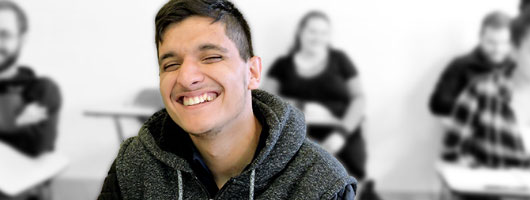 Pictured | Ameer Abdulhadi | Clinical Laboratory Science / Minor in Health Care Management | Baghdad, Iraq (hometown)
Pictured | Ameer Abdulhadi | Clinical Laboratory Science / Minor in Health Care Management | Baghdad, Iraq (hometown)
Bachelor of Science in Clinical Laboratory Science
The Bachelor of Science in Clinical Laboratory Science (CLS) provides students with the entry-level skills and knowledge needed become success laboratory professionals. Dedicated classroom and laboratory spaces are located in Dwyer Hall. Students complete courses in clinical chemistry, hematology, immunohematology, immunology, management, microbiology, molecular diagnostics, and urinalysis and body fluids analysis. Clinical rotations occur in clinical laboratories in the greater Michiana region.
Admission to the professional portion of the CLS program occurs after completion of all required prerequisite coursers. Students may enter the CLS program as:
- a traditional four-year degree student
- a transfer student
- a second degree student with a Bachelor of Science in biology, chemistry, or other related degree
Student who enter the CLS program as transfer or second degree students may be required to complete prerequisite courses prior to starting CLS courses.
Clinical Laboratory Science Program Objectives
In order to fulfill the requirements of a Bachelor of Science in Clinical Laboratory Science, graduates will be able to:
- Synthesize the fundamental biological sciences necessary for integration into clinical laboratory diagnostics.
- Have entry-level professional knowledge in the most common areas of the clinical lab, including Hematology, Clinical Chemistry, Urinalyses, Clinical Microbiology, and Blood banking.
- Understand the professional, ethical, and practical responsibilities of laboratorians in the interdisciplinary health care team.
- Be prepared to sit for the national certification exam offered through the American Society of Clinical Pathology Board of Certification (ASCP BOC) or an equivalent certifying agency.
NAACLS Accreditation
The IU South Bend Clinical Laboratory Science program is accredited by the National Accrediting Agency for Clinical Laboratory Sciences (NAACLS), which allows all students who graduate from this program to sit for the American Society for Clinical Pathology Board of Certification (ASCP BOC) MLS certification exam and/or the American Medical Technology (AMT) Medical Technologist certification exam.
Academic Advising
College policy on advising requires that students meet with their academic advisors at least once each year, and in some departments, prior to each semester enrollment. Advising holds are placed on all Vera Z. Dwyer College of Health Sciences students prior to advance registration and are released following advising appointments. Students with a declared major are advised in their academic units. To determine who your advisor is and how to contact them, see One.IU.
Degree Requirements (120 cr.)
Degree Map >>
Students receiving the Bachelor of Science in Clinical Laboratory Science must complete 120 credits including:
- IU South Bend Campuswide General Education Curriculum (33 cr.)
- Science Prerequisite Requirements (31 cr.)
- Major Requirements (49 cr.)
- Free Electives (balance of credits needed to equal 120 credit requirement)
- Students are required to apply officially to the program upon completion of their prerequisite courses and the majority of their co-requisite courses, typically during the summer between their sophomore and junior year.
- All courses are 3 credit hours, unless otherwise noted.
Major Requirements (49 cr.)
- CLS-B 399 Human Behavior and Social Institutions
VT: Clinical Laboratory Management - CLS-C 405 Clinical Chemistry
- CLS-C 406 Diagnostic Methods (2 cr.)
- CLS-C 407 Hematology
- CLS-C 408 Hematologic Methods (2 cr.)
- CLS-C 415 Clinical Molecular Diagnostics and Special Chemistry
- CLS-C 417 Advanced Hematology and Cancer
- CLS-E 401 General Externship I (4 cr.)
- CLS-E 402 General Externship II (4 cr.)
- CLS-I 407 Immunohematology and Transfusion Medicine
- CLS-I 408 Blood Banking Methods (2 cr.)
- CLS-I 411 Clinical Immunodiagnostics
- CLS-L 201 Introduction to the Diagnostic Laboratory (1 cr.)
- CLS-L 202 Laboratory Math and Techniques (1 cr.)
- CLS-L 420 Urinalysis (2 cr.)
- CLS-M 403 Clinical Microbiology
- CLS-M 404 Microbiological Methods (2 cr.)
- CLS-M 411 Mycology and Parasitology (2 cr.)
- CLS-M 413 Advanced Clinical Microbiology
Science Prerequisite Requirements (31 cr.)
- BIOL-L 101 Introduction to Biological Sciences I (5 cr.)
- BIOL-L 102 Introduction to Biological Sciences 2 (5 cr.)
- BIOL-L 211 Molecular Biology
- 300 or above biology course
- CHEM-C 105 Principles of Chemistry I
- CHEM-C 106 Principles of Chemistry II
- CHEM-C 125 Experimental Chemistry I (2 cr.)
- CHEM-C 126 Experimental Chemistry II (2 cr.)
- MICR-M 250 Microbial Cell Biology (or above)
- MICR-M 255 Microbiology Laboratory (2 cr.) (or above)